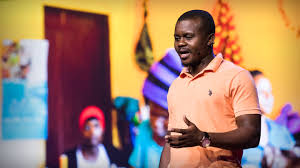(单词翻译:单击)
Currently, most refugees live in the cities rather than in the refugee camps.
目前,大多数难民都生活在城市里,而不是难民营。
We represent over 60 percent of the number of refugees globally.
我们代表了全球超过百分之六十的难民。
With the majority of refugees living in urban areas, there is a strong need for a paradigm shift and new thinking.
大多数难民都生活在城区,因此我们迫切需要转变思维模式,采取一种新思路。
Rather than wasting money on building walls, it would be better to spend on programs to help refugees to help themselves.
与其花钱大兴土木,不如将钱用在一些帮助难民进行自救的项目上。
We always have to leave behind all our possessions.
我们总会不得已丢弃我们的财产。
But not our skills and knowledge. If allowed to live a productive life,
但会保留技能和知识。如果能让难民过上自足的生活,
refugees can help themselves and contribute to the development of their host country.
他们就能自救并对收容国的发展作出贡献。
I was born in the city called Bukavu, South Kivu, in the Democratic Republic of Congo.
我出生在布卡武,一个位于刚果民主共和国基伍南部的城市。
I am the fifth-born in a family of 12 children.
我家共有12个孩子,我排行第五。
My father, a mechanic by profession, worked very hard to send me to school.
我的父亲,是一名技工。他辛苦工作,供我上学。
Just like other young people, I had a lot of plans and dreams.
和其他年轻人一样,我对未来有许多规划和梦想。
I wanted to complete my studies, get a nice job, marry and have my own children and support my family.
我打算完成学业后,找到一份体面的工作,结婚生子,赚钱养家。
But this didn't happen. War in my homeland forced me to flee to Uganda in 2008, nine years ago.
但是这些都没有实现。战争迫使我背井离乡,在2008年逃到了乌干达,也就是九年前。
My family joined a steady exodus of refugees who settled in Uganda's capital, Kampala.
我们全家加入了逃亡的难民大军,并定居在坎帕拉(乌干达首都)。
In my country, I lived already in the city, and we felt Kampala was much better than a refugee camp.
在我的国家,我住在城市里,所以我们感觉坎帕拉要比难民营好得多。
Refugees in the cities have always been denied international assistance, even after their recognition by UNHCR in 1997.
但是城市里的难民寻求国际援助却屡屡被拒,即使他们已经在1997年得到联合国难民署的认可。
In addition to the poverty problem we were confronted with as the local urban poor,
作为当地城市的贫困人群,除了要面对贫困问题,
we were facing challenges due to our refugee status, such as a language barrier.
因为难民身份,我们还要面临很多挑战,比如语言障碍。
In Congo, the official language is French. But in Uganda, it is English.
在刚果,官方语言是法语。但在乌干达是英语。
We didn't have access to education and health.
我们无权接受教育,享受医疗。

We were exposed to harassment, exploitation, intimidation and discrimination.
我们会遭受骚扰、剥削、恐吓和歧视。
Humanitarian organizations mostly focused on the formal settlement in rural areas, and there was nothing in place for us.
人道主义组织将焦点放在难民在偏远地区的定居问题,而对于我们就没有什么实际行动。
But we didn't want handouts. We wanted to work and support ourselves.
我们并不想要救济品,我们想要工作,养活自己。
I joined my other two colleagues in exile and set up an organization to support other refugees.
我和另外两个流亡的同事聚在一起,建立了一个组织,来帮助其他难民。
YARID -- Young African Refugees for Integral Development -- began as a conversation within the Congolese community.
YARID--青年非洲难民的全面发展--这个组织起源于刚果社区内部的一次谈话。
We asked the community how they could organize themselves to solve these challenges.
当时我们询问大家,如何能够自发组织起来,解决这些难题。
The YARID programs for support evolve in stages,
YARID的支持项目正在逐步发展,
progressing from soccer community, to English language to sewing livelihoods.
从社区足球,到英语语言培训,再到缝纫技能培训。
The soccer changed the energy of unemployed youth and connected people from different communities.
足球转移了失业青年的精力,把来自不同社区的人联系起来。
The free English classes help empower people to engage with the Ugandan community,
免费英语课程使人们能够与当地的乌干达人接触,
allowing them to get to know their neighbors and sell wares.
从而认识周围的人,并有机会售卖商品。
The vocational training program offers livelihood skills,
职业培训课程提供谋生技能,
and with them, important opportunities for economic self-reliance.
有了这些技能,人们就有机会实现经济自立。
We've seen so many families become self-sustaining. We've seen who no longer needs our help.
我们已经看到许多家庭实现了自给自足。我们也看到有些人已经不再需要帮助。
As YARID's programs have expanded, it has included an increasing range of nationalities
随着YARID的项目发展壮大,它所涵盖的国籍范围也在不断扩大,
Congolese, Rwandan, Burundian, Somalis, Ethiopian, South Sudanese.
刚果人,卢旺达人,布隆迪人,索马里人,埃塞俄比亚人,南苏丹人。
Today, YARID has supported over 3,000 refugees across Kampala and continues supporting more.
至今,YARID已经在整个坎帕拉帮助了超过三千名难民,我们还将继续帮助更多人。
Refugees want empowerment, not handouts. We know our community better than anyone.
难民需要自立能力,而不是救济品。我们比任何人都更了解自己的群体。
We understand the challenges and opportunities we face to become self-reliant.
我们了解实现自力更生所要面对的挑战与机遇。
I know better than anyone that initiatives created by refugees work.
我比任何人都更理解在难民工作中产生的那些倡议。
They need to be internationally recognized and supported.
它们需要得到国际的认可和支持。
Give us the support we deserve, and we will pay you back with interest. Thank you so much.
给予我们所需的支持,滴水之恩当涌泉相报。谢谢。


